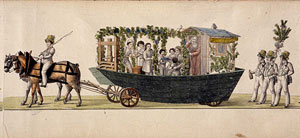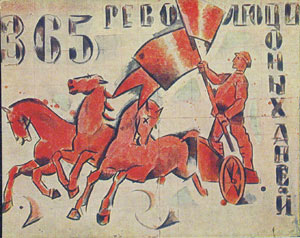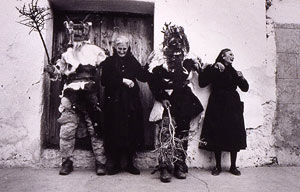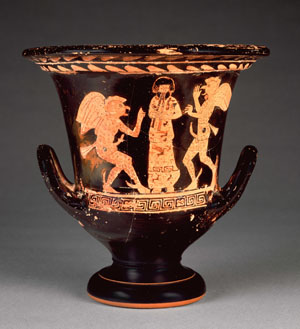 |
 |
 |
|
"A life without festivals is like a road without inns," said the ancient Greek philosopher Demokritos. Festivals still are the most spirited collective activities celebrated in any society. From ancient Mesopotamian rites to the annual Burning Man celebration held in Nevada, festivals have played a crucial role in societies. In them, communities ease social conventions and display power structures, gender roles, and religious ideals. Festivals seem so indispensable to the lives of communities that totalitarian regimes, such as those of the Soviet Communists and the German National Socialists, invested considerable energy in transforming religious rituals into staged civic festivals.
As part of the 2006–2007 research theme, "Religion and Ritual," and complementing the Festival Collection at the Research Library, the Getty Research Institute presents a series of scholarly seminars at the Getty Center and the Getty Villa that explore how festivals have been celebrated over many millennia.
Please note that seating is limited and programs are subject to change.
|
 |

|

 |
 |
 |
|
Date: Friday, January 19, 2007
Time: 10:00 a.m.–12:00 p.m.
Location: Getty Center, Getty Research Institute Lecture Hall Admission: Free; reservations required. Call (310) 440-7300 for reservations and parking information.
Presenter: Mark Steinberg, University of Illinois
The Russian Revolution and the project to create a new socialist life was an apocalyptic moment in which ordinary time was replaced by a mythic time of transfiguration and salvation. This was politics and culture in a sacred key. But the revolutionary state and its followers also struggled to eradicate existing religion in the name of modern secular truth.
Mark Steinberg, professor of history at the University of Illinois and editor of the interdisciplinary Slavic Review, discusses this ambivalent intertwining of secular and sacred, examining how it pervaded the public festivals and rituals that were meant both to symbolize the new era and to help create it. Steinberg also examines a variety of stories from this era, such as revolutionary "mystery plays," commemorations of revolutionary holidays, artists' designs for festive public spaces, religious symbols and vocabularies in revolutionary language, and appropriations of Christian festivals.
|
 |


|

 |
 |
 |
 |
|
Date: Friday, March 2, 2007
Time: 10:00 a.m.–12:00 p.m.
Location: Getty Center, Getty Research Institute Lecture Hall
Admission: Free; reservations required. Call (310) 440-7300 for reservations and parking information.
Presenter: William A. Christian Jr., University of California, Berkeley
Spanish fiestas since the Counter-Reformation have tended to be of two types: the fiesta sagrada and the fiesta profana. The photographs of Cristina García Rodero suggest that in religious fiestas, communities explore humanity's relationship with the divine, while in secular fiestas they explore humanity's relationship with animals. Both explorations can involve not only ritual personal contact with the other—saint or animal—but also the assumption of the other's role and appearance, a kind of species transvestitism. García Rodero's photographs point to the similarity of these two explorations.
William A. Christian Jr., independent scholar and visiting professor of history at the University of California, Berkeley, draws on his recent study of García Rodero's fiesta photographs in the special collections of the Research Library at the Getty Research Institute to discuss these issues.
|
 |


|

 |
 |
 |
 |
|
Date: Friday, March 30, 2007
Time: 10:00 a.m.–12:00 p.m.
Location: Getty Villa, Meeting Rooms
Admission: Free; reservations required. Call (310) 440-7300 for reservations and parking information.
Albert Henrichs, Eliot Professor of Greek Literature, Harvard University, discusses the religious aspects of theatrical productions in the context of ancient Athenian Festivals.
|
 |


|

 |
 |
 |
 |
|
Date: Wednesday, April 11, 2007
Time: 10:00 a.m.–12:00 p.m.
Location: Getty Center, Getty Research Institute Lecture Hall
Admission: Free; reservations required. Call (310) 440-7300 for reservations and parking information.
Ronald Hutton, professor in the department of Historical Studies, University of Bristol, England
The American term "New Age" is shorthand for a complex of spiritualities that have no festivals in common. But to historians and social anthropologists, the seasonal celebrations of modern Pagans, one particular group often placed under the "New Age" umbrella, are highly significant. Pagan celebrations occur eight times a year in a distinctive cycle. These celebrations take place all over the Western world and are leaking into popular culture. Ronald Hutton shows how a study of these celebrations gives us insight into the process of formation of a sequence of religious festivals, illustrates the way in which tradition is created in the modern world and in which older ideas and customs are refashioned for modern needs, and reveals interesting issues concerning the place of seasonal festivity in contemporary Britain and America.
|
 |


|

 |
 |
 |
 |
|
Date: Friday, May 11, 2007
Time: 10:00 a.m.–12:00 p.m.
Location: Getty Villa, Meeting Rooms
Admission: Free; reservations required. Call (310) 440-7300 for reservations and parking information.
Presenter: Beate Pongratz-Leisten, Princeton University
Beate Pongratz-Leisten, lecturer in Near Eastern Studies at Princeton University and author of the forthcoming book Cosmology and Anthropology in Mesopotamia, discusses local ritual practices in ancient Mesopotamia and how these practices placed meaning on cultural and physical surroundings, thus creating a religious landscape. Specifically, Pongratz-Leisten focuses on the new year festival celebrated in ancient Babylonia and Assyria, which was used to reinforce the relationships between the cultural and administrative center and the periphery—both topographical and societal—and to display the military and political achievements of those in power, illustrating the strong interplay between military strategy and cultic practice in Mesopotamian religious politics.
|
 |
|

 |
 |
 |
 |
|
Date: Friday, June 8, 2007
Time: 10:00 a.m.–12:00 p.m.
Location: Getty Villa, Meeting Rooms
Admission: Free; reservations required. Call (310) 440-7300 for reservations and parking information.
Presenter: Michael Stausberg, University of Bergen, Norway
Zoroastrianism was founded in Iran more than 3,000 years ago. Practiced extensively in antiquity, it still exists today with some 150,000 followers, most of whom live in India (the Parsees), Iran, and North America. Michael Stausberg, professor in the History of Religions at the University of Bergen, discusses the history of Zoroastrian festivals, their development and principal elements.
|
 |


|

 |
 |
 |
 |





